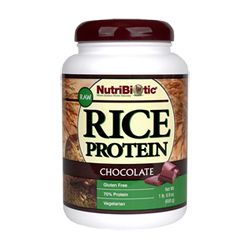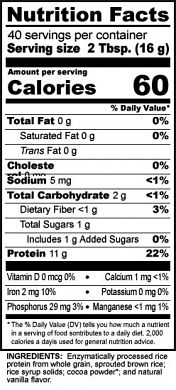Our Rice Protein is an excellent source of vegan protein. Most people are familiar with soy and whey protein, and while they each provide sound nutrition, rice protein offers additional benefits. Whey protein comes from milk, and some people either cannot or do not wish to use animal-based protein. Soy protein often is difficult for people to digest and may pose allergy risks. Our Rice Protein offers an alternative to soy without the animal products of whey. And, Rice Protein is utilized more efficiently by the body than soy. It has a mild flavor similar to that of Cream of Rice cereal and may be used in beverages, sprinkled on cereals and yogurt, and added to cooked dishes to boost the protein content without adding a lot of fat or calories.
Available in:
- Plain - 21 oz., 3 lb., and 12 Single Serve Packets
- Vanilla - 21 oz., 3 lb., and 12 Single Serve Packets
- Chocolate - 22.9 oz., 3 lb., and 12 Single Serve Packets
- Mixed Berry - 21 oz. and 12 Single Serve Packets
Rice is a carbohydrate. How do you get protein from it? - All foods contain amino acids, which are the building blocks of what we collectively call protein. For instance, broccoli contains protein, as do all fruits and vegetables and grain products. We use a unique process that allows us to isolate the protein from the carbohydrate portion of the rice. The end result is an extensive amino acid profile that includes 19 amino acids including all 9 essential amino acids.
Does that mean the rice protein is chemically derived? I'm chemically intolerant and have to avoid food additives. - Our Rice Protein is not chemically processed. We use natural, organic, plant enzymes that are GMO free to break down and digest the carbohydrate portion of the rice, leaving behind the protein. Our method of extraction leaves a very pure protein, free of additives or chemicals that can cause sensitivities.
Is the Rice Protein organic? - Our original Rice Protein is not certified organic, however, it has been tested and proven to be free of pesticides, herbicides, and PCBs. We do offer Organic Rice Protein, which is also certified kosher, in Plain, Vanilla, and Chocolate.
I noticed your label gives a standard nutritional breakdown, which includes carbohydrate. What form is this carbohydrate in, and why is it there if I am buying rice protein? - The carbohydrate in the Rice Protein is a complex carbohydrate, a natural component of the product. This amount is very minimal. No sugars have been added to the Plain, Vanilla, or Mixed Berry. There is a small amount of rice syrup solids used to lightly sweeten the Chocolate.
Is Rice Protein considered a complete protein? - The term "complete protein" refers to a source of protein that contains all nine essential amino acids in adequate proportions. Rice Protein contains these nine amino acids, plus many other nonessential amino acids, but does not meet the required proportions of histidine (in the Chocolate flavor) and lysine, methionine, or phenylalanine (in all flavors). All of the amino acids in our Rice Protein are naturally occurring components of the rice. We have added nothing to our product. Persons on restrictive diets would do well to consult their health care practitioner or nutritionist before adopting or rejecting the use of our Rice Protein. We cannot recommend the use of our product to treat conditions other than hunger.
For individuals looking for specific ratios of amino acids, the following charts will be helpful:
|
NATURALLY OCCURRING AMINO ACIDS PER SERVING OF PLAIN, VANILLA & MIXED BERRY
|
| Alanine | 690 mg | Isoleucine* | 510 mg | Threonine* | 450 mg |
| Arginine | 975 mg | Leucine* | 1035 mg | Tryptophan* | 165 mg |
| Aspartic Acid | 1125 mg | Lysine* | 375 mg | Tyrosine | 600 mg |
| Cystine/2 | 240 mg | Methionine* | 345 mg | Valine* | 720 mg |
| Glutamic Acid | 2235 mg | Phenylalanine* | 675 mg | ||
| Glycine | 540 mg | Proline | 540 mg | ||
| Histidine* | 285 mg | Serine | 645 mg |
|
NATURALLY OCCURRING AMINO ACIDS PER SERVING OF CHOCOLATE
|
| Alanine | 539 mg | Isoleucine* | 642 mg | Threonine* | 522 mg |
| Arginine | 750 mg | Leucine* | 1001 mg | Tryptophan* | 171 mg |
| Aspartic Acid | 1001 mg | Lysine* | 563 mg | Tyrosine | 451 mg |
| Cystine/2 | 264 mg | Methionine* | 253 mg | Valine* | 662 mg |
| Glutamic Acid | 1893 mg | Phenylalanine* | 482 mg | ||
| Glycine | 347 mg | Proline | 671 mg | ||
| Histidine* | 247 mg | Serine | 545 mg |
* Essential Amino Acids
Which amino acids have you added, and are they from natural or artificial sources?- All amino acids in the rice protein are naturally occurring components of the whole grain, sprouted brown rice.
Does the Rice Protein contain potassium? If so, how much? - There are only very trace amounts of potassium in the Rice Protein. There is not enough to be listed on the Nutrition Facts, which means there is less than a half of a percent of the Daily Value.
What is the Protein Efficiency Ratio (PER) of your Rice Protein? - The Protein Efficiency Ratio (PER) is the measure of actual protein available for the body to use. This PER is related to the percentage of the protein digested by the body. With Rice Protein, after 4 hours better than 80% of the protein has been digested, compared to only about 57% for soy. The actual PER number of Rice Protein is 2.75. Egg is the highest at 3.99, milk is second with 3.45, rice third, and soy is last with a PER of 2.32.
Is the Rice Protein gluten free? - Yes, our Rice Protein is made from gluten free, whole grain, sprouted brown rice and is processed using organic plant enzymes that are not related to wheat or any of its relatives. Therefore, processing of the rice does not contaminate the rice protein with gluten in any way. We recommend that further concerns regarding the Rice Protein for those with severe food sensitivities should consult their doctor or dietician.
Does the Rice Protein contain lead? - We are confident based on all of our testing conducted by an independent, third party, accredited lab and Certificates of Analysis provided by our suppliers that our Rice Protein lead content falls within the FDAs Provisional Total Tolerable Intake (PTTI) level for adults.
Does the Rice Protein contain any melamine? - Click here for a statement.
Should the Rice Protein be stored in the refrigerator? - We do not recommend storing the Rice Protein in the refrigerator as it may draw dampness. We do suggest storing it in a cool, dry location such as a cupboard.



